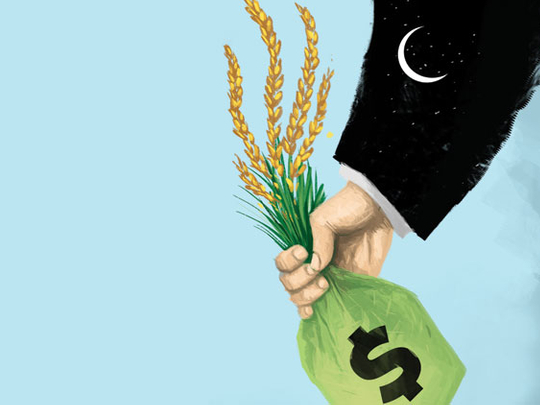
To any charity organisation in the Muslim world, Ramadan is prime time for showcasing achievements and generating funds. After all, Ramadan is above all else, the month of giving. Despite the debates that resurface every year before and during the month, the notion of charity is one that that is rarely contested.
Families and individuals alike find themselves bombarded with advertisements of all kinds, urging them to donate to causes that range from iftar meals and Eid attire for the needy to assisting orphans, widows and refugees. Simply put, your ‘buck’ is portrayed as the solution to poverty, abuse, war and other crises. When you reach out for your phone to dial that SMS code, you are supposedly helping to make a difference, in one way or another.
And yet, an additional 89 million people were pushed into extreme poverty by the end of last year. This means that 1.7 billion people today live on under $1.25 (roughly Dh4.5) a day. In 2010 alone, around 925 million people across the world were reported to have gone hungry and were malnourished.
Despite the fact that billions are being donated annually, the most immediate and urgent issues in the world refuse to budge. So what is it that we are doing wrong?
The truth of the matter is, our approach to charity from a development standpoint is largely misguided. Thus, allow me this Ramadan, to put every debate out there to a halt, and dismiss this longstanding ‘fact of life’: Charity is the answer to the world’s problems. For unless done ‘right’, charity becomes, bluntly put, a waste.
Throughout the years, charitable establishments and professionals have done an adequate job in raising awareness about many issues around the world that require humanitarian intervention. What they have failed to do however is make people more knowledgeable about the value of their money from a humanitarian and developmental angle. A donation is nothing less than an investment. Every donor must approach giving with as much scrutiny and care as they would when investing their savings.
Informed choices
How can donors make more informed choices when deciding to give?
First, we need to understand how sustainability factors into the debate. Though most people believe that charity is always beneficial, many argue that it helps the recipient with their problem, but does little to deal with the causes of that problem. Many charities do ‘band-aid’ work, either exclusively or most of the time. In other instances, charities do an effective job at combating an issue, and through that help lessen the effects of greater relevant problems.
For example, donating to feed a child in Somalia is a temporary solution, as he/she will probably go hungry again if your charity of choice stops working in that country. On the other hand, donating to an organisation that invests in teaching farmers in a community better farming techniques will not only ensure they sustain a livelihood, but that the economy as a whole is elevated, leading to less people going hungry.
Another thing a donor needs to realize is that every charity establishment has an operational cost that covers salaries, transport, rent and other costs that are necessary to support it while it tries to achieve its key goals. How much of your Dh100 is going to the beneficiary? That number will be greatly affected by the country you donate to, the organisation, as well as the cause you choose. It is more expensive for example to fund a girls’ education programme in Afghanistan than it is to deworm a child in Bangladesh. This is because (a) Afghanistan is a risky country to work in and (b) education programs are more costly than deworming which costs as little as $0.02 per pill.
A high overhead cost does not mean that less of your money is going to the beneficiary; it can mean that some of it is going towards necessary support costs such as transport, monitoring and evaluation. Furthermore, when you favour charities with low overhead costs, you are actually encouraging them to hire unqualified people, run cheaper but ineffective programmes or just manipulate their finances.
More often than not, we donate to the same cause and same organisation we donated to last year, and the year before. We are suspicious of ‘newcomers’ and prefer donating to causes and organisations that are familiar to us and have been around for some time. Seldom do we question how well our charities of choice are doing with our money.
This year, before you send that SMS code, define the real issue and find an organisation that uses a sustainable and innovative approach to tackle it. While there are many aspects that we cannot control to ensure effective and impactful giving (such as natural disasters, economic trends and political stability in developing countries), we can in fact control our choice of funding sustainable projects in developing countries as opposed to ‘quick-fixes’.
In 2010, the World Giving Index reported that roughly three million people in the UAE donated to charities. How different would this world be if we turned three million donors, into three million people who make long-term commitments that can yield long-lasting positive impact? How effective will our giving be if we chose not to donate, but to invest in a cause?
Maria Hanif is a development specialist. You can follow her on Twitter at www.twitter.com/Maria_Hanif












